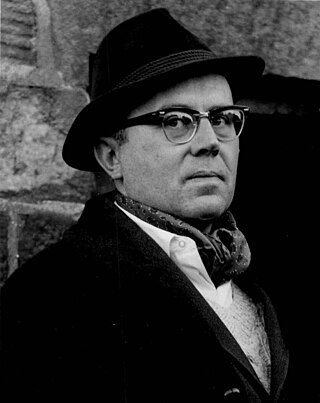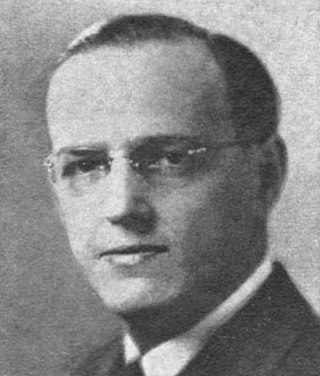Related Research Articles
Conservatism is a cultural, social, and political philosophy that seeks to promote and to preserve traditional institutions, practices, and values. The central tenets of conservatism may vary in relation to the culture and civilization in which it appears. In Western culture, depending on the particular nation, conservatives seek to promote a range of social institutions such as the nuclear family, organized religion, the military, property rights, and monarchy. Conservatives tend to favor institutions and practices that guarantee stability and evolved gradually. Adherents of conservatism often oppose certain aspects of modernity and seek a return to traditional values, though different groups of conservatives may choose different traditional values to preserve.
Communitarianism is a philosophy that emphasizes the connection between the individual and the community. Its overriding philosophy is based on the belief that a person's social identity and personality are largely molded by community relationships, with a smaller degree of development being placed on individualism. Although the community might be a family, communitarianism usually is understood, in the wider, philosophical sense, as a collection of interactions, among a community of people in a given place, or among a community who share an interest or who share a history. Communitarianism usually opposes extreme individualism and rejects extreme laissez-faire policies that deprioritize the stability of the overall community.
Right-wing politics describes the range of political ideologies that view certain social orders and hierarchies as inevitable, natural, normal, or desirable, typically supporting this position based on natural law, economics, authority, property or tradition. Hierarchy and inequality may be seen as natural results of traditional social differences or competition in market economies.
Paleoconservatism is a political philosophy and strain of conservatism in the United States stressing American nationalism, Christian ethics, regionalism, and traditionalist conservatism. Paleoconservatism's concerns overlap with those of the Old Right that opposed the New Deal in the 1930s and 1940s as well as with paleolibertarianism and right-wing populism.
A Red Tory is an adherent of a centre-right or paternalistic-conservative political philosophy derived from the Tory tradition; it is most predominant in Canada, but also has a presence in the United Kingdom. This philosophy tends to favour communitarian social policies, while maintaining a degree of fiscal discipline and a respect of social and political order. It is contrasted with "Blue Tory" or "High Tory". Some Red Tories view themselves as small-c conservatives.
Liberal conservatism is a political ideology combining conservative policies with liberal stances, especially on economic issues but also on social and ethical matters, representing a brand of political conservatism strongly influenced by liberalism.

Russell Amos Kirk was an American political theorist, moralist, historian, social critic, and literary critic, known for his influence on 20th-century American conservatism. His 1953 book The Conservative Mind gave shape to the postwar conservative movement in the U.S. It traced the development of conservative thought in the Anglo-American tradition, giving special importance to the ideas of Edmund Burke. Kirk was considered the chief proponent of traditionalist conservatism. He was also an accomplished author of Gothic and ghost story fiction. He is often considered one of the most significant conservative men of letters of the twentieth century.

The Conscience of a Conservative is a 1960 book published under the name of Arizona Senator Barry Goldwater who was the 1964 Republican presidential candidate. It helped revive the American conservative movement and make Goldwater a political star, and it has influenced countless conservatives in the United States, helping to lay the foundation for the Reagan Revolution of the 1980s.
In the United States, conservatism is based on a belief in limited government, individualism, traditionalism, republicanism, and limited federal governmental power in relation to U.S. states. Conservative and Christian media organizations, along with American conservative figures, are influential, and American conservatism is one of the majority political ideologies within the Republican Party.

Walter Henry Judd or I-te Chou, was an American politician and physician, best known for his battle in Congress (1943–63) to define the conservative position on China as all-out support for the Nationalists under Chiang Kai-shek and opposition to the Communists under Mao Zedong. After the Nationalists fled to Formosa (Taiwan) in 1949, Judd redoubled his support.
Robert Alexander Nisbet was an American conservative sociologist, a professor at the University of California, Berkeley, Vice-Chancellor at the University of California, Riverside, and an Albert Schweitzer Professor at Columbia University.
Traditionalist conservatism, often known as classical conservatism, is a political and social philosophy that emphasizes the importance of transcendent moral principles, manifested through certain natural laws to which society should adhere prudently. Traditionalist conservatism is based on Edmund Burke's political views. Traditionalists value social ties and the preservation of ancestral institutions above excessive individualism.
Articles in social and political philosophy include:
The Russell Kirk Center for Cultural Renewal is a nonprofit educational organization based in Mecosta, Michigan. It was founded in order to continue the legacy of Dr. Russell Kirk, an American political theorist, historian, social critic, literary critic, and fiction author. The Center is known for promoting traditionalist conservatism and regularly publishing Studies in Burke and His Time and The University Bookman, the oldest conservative book review in the United States.

This timeline of modern American conservatism lists important events, developments and occurrences which have significantly affected conservatism in the United States. With the decline of the conservative wing of the Democratic Party after 1960, the movement is most closely associated with the Republican Party (GOP). Economic conservatives favor less government regulation, lower taxes and weaker labor unions while social conservatives focus on moral issues and neoconservatives focus on democracy worldwide. Conservatives generally distrust the United Nations and Europe and apart from the libertarian wing favor a strong military and give enthusiastic support to Israel.
This is a selective bibliography of conservatism in the United States covering the key political, intellectual and organizational themes that are dealt with in Conservatism in the United States. Google Scholar produces a listing of 93,000 scholarly books and articles on "American Conservatism" published since 2000. The titles below are found in the recommended further reading sections of the books and articles cited under "Surveys" and "Historiography." The "Historiography" and "Critical views" section mostly comprise items critical or hostile of American conservatism.
There has never been a national political party in the United States called the Conservative Party. All major American political parties support republicanism and the basic classical liberal ideals on which the country was founded in 1776, emphasizing liberty, the pursuit of happiness, the rule of law, the consent of the governed, opposition to aristocracy and fear of corruption, coupled with equal rights before the law. Political divisions inside the United States often seemed minor or trivial to Europeans, where the divide between the Left and the Right led to violent political polarization, starting with the French Revolution.
Traditionalist conservatism in the United States is a political, social philosophy and variant of conservatism based on the philosophy and writings of Aristotle and Edmund Burke.
The Imaginative Conservative (TIC) is an American online conservative journal, founded in 2010.

Common good constitutionalism is a legal theory formulated by Harvard Law Professor Adrian Vermeule that asserts that “the central aim of the constitutional order is to promote good rule, not to ‘protect liberty’ as an end in itself”. Vermeule describes it as an attempt to revive and develop the classical legal tradition by understanding enacted law as a positive application of background natural law principles. Within this tradition, he claims law is defined as "an ordinance of reason promulgated by political authorities for the common good." Vermeule states that law in this sense is "not tethered to particular written instruments of civil law or the will of the legislators who created them" but instead embody rational determinations of the common good, and it is those determinations, as well as the natural law background against which they are made, which constitute the law. Vermeule says that these principles include "a candid willingness to “legislate morality.”
References
- ↑ Ohio Northern University Claude W. Pettit College of Law
- ↑ "Bruce Frohnen's Faculty Profile at ONU". Archived from the original on 2013-10-16. Retrieved 2012-04-04.
- ↑ "Bruce P. Frohnen CV" (PDF). Archived from the original (PDF) on 2012-03-02. Retrieved 2016-12-22.
- ↑ The One and The Many: Individual Rights, Corporate Rights and the Diversity of Groups, 107 W.Va. L. Rev. 789 (2004).
- ↑ Constitutional Morality and the Rule of Law, 26 J. L. & Politics 497 (2011).
- ↑ Is Constitutionalism Liberal?, 33 Campbell L. Rev. 529 (2011).
- ↑ Rethinking Rights: Historical, Political, and Philosophical Perspectives
- ↑ The Imaginative Conservative
- ↑ University Bookman Online